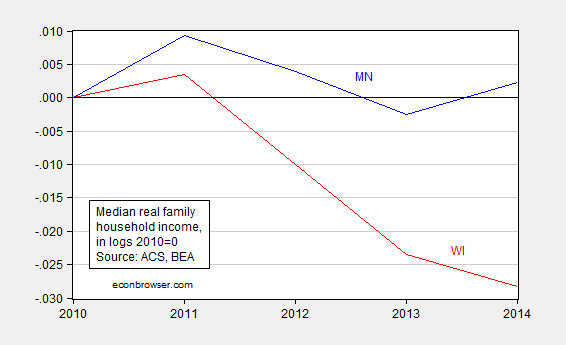The American Community Survey data for 2014 are out (h/t Samuel). Real household family income in Wisconsin continues to decline relative to that in Minnesota.

Figure 1: Log family household income, 2009=0, for Minnesota (blue), and Wisconsin (red). Deflation using core consumption deflator. Source: BuCensus/American Community Survey and BEA via FRED, and author’s calculations.
Some individuals have touted trends in Wisconsin’s median household income relative to Minnesota. The Census Bureau warns researchers from doing intertemporal comparisons using the standard series (e.g., available on FRED), given data breaks due to different methods of interpolation. Here I plot the American Community Survey (ACS) series for Minnesota and Wisconsin, which are not subject to the same problem of comparability, and are estimated with greater precision due to larger sample sizes.
Dear Dr. Chinn,
Thanks for your work. At one point, besides a lot of dairy farms and plenty of cheese, Wisconsinites could depend on funding for roads, public schools, clean water, jobs that paid a decent wage and a progressive tradition that took care of people with disabilities, the elderly, and less fortunate in the community. I recognize that in this state less and less. This is not the Wisconsin I used to know.
Before 1990, Denver was considered a “cow town.” After 1990, high-skilled workers from other states, particularly California and Texas, drove Denver’s economy.
The Denver Tech Center, 10 miles southeast of Downtown Denver, grew faster than Silicon Valley. While the private sector created dozens of tech campuses, impressive new malls, and upper middle class housing tracts, replacing empty fields all the way to the mountains in the west and Castle Rock in the south, it also created a bigger tax base and facilitated its growth.
So, Downtown Denver was able to build three new pro sports stadiums, a new convention center, a huge central library, renovate lower downtown, repave the streets, rebuild the sidewalks, construct an international airport, a light rail system, etc..
Dear Peak Trader,
What you say is interesting. Sometimes, I think that the policies currently being put forward in Wisconsin (such as cuts in education, anti-Union, etc.) is leading to this:
A grim bargain
Once a weakness, low-skilled workers who get paid little have become the Deep South’s strength
http://www.washingtonpost.com/sf/business/2015/12/01/a-grim-bargain/
Here is a quote from the article:
“Our government, they sold us down the river,” Deshler said. “They can go to hell.” His dad asked Deshler if he wanted to quit.
Instead, Deshler did something else. He started talking at work to Joseph Boykins, a fast-talking shift worker — “almost a televangelist type,” Deshler said — who had been trying for weeks to drum up interest in a union. Unions in the South were far less common than in the rest of the nation, and Deshler’s dad had always said that unions weren’t worth the trouble.
Samuel, your article is mostly the view of one person. However, the article says half of the applicants for the new Chinese plant were rejected, because of felonies and failing drug tests, which says a lot about the community.
The article also says the average machinist earns $19 an hour in Alabama, which is a good middle class wage for Alabama, particularly with overtime.
Unions isn’t the answer, because they typically don’t promote work, and more work is needed to help build a business and a community. Also, if Americans want an education, there are more than enough opportunities.
I don’t know what the complaint is about government, except attracting a business by giving it a tax break. Would the community be better off without that business?
Peak,
I’m not sure what point you are trying to make with your statement about Denver Tech Center – growing faster than Silicon Valley. It is quite possible that DTC grew faster in the 90-ies (starting from zero makes that easy), but in the year 2001 all of Colorado had 98,500 tech jobs, and they just recently (2014) managed to exceed that number.
The total number of Silicon Valley high tech jobs, is today about 1,5 M, and the area added about 58,000 jobs last year (about 60% of Colorado’s total high-tech employment) – Silicon Valley, like Colorado, has recently exceeded the employment numbers seen during the dot-com bubble – but again – I don’t understand what your point is. Thought we were talking about Wisconsin. BTW, Chicago (also) claims to have faster job growth than Silicon Valley, and it is a lot closer to Wisconsin than either SV of DTC.
Bellanson, my point is a brain drain in one area causing a brain gain in another area has huge economic effects on both areas.
Although, the population in Colorado is much smaller than California, it has one of the highest educated workforces compared to other states.
Any data on how much the sheer, raw crappiness of Milwaukee contributes to the poor relative performance of WI?
Can’t be all down to Gov. Walker.
As an ex-Clevelander, I recognize the ugly symptoms.
Wasn’t Scott Walker the county executive for Milwaukee County? Failure seems to follow this man wherever he goes.
A governor’s ability to influence economic conditions is constrained by the larger macroeconomic picture, which is pretty much up to the Fed, Congress and the President. That said, there’s plenty of thing that a governor can do to make matters worse…and Walker seems to have all the wrong buttons. He’s simply incompetent.
and that is exactly why scott walker is also out of the presidential race. how bad to you really have to be to get pushed out of an election cycle by the current set of republican candidates?
Sometime ago you published a formula for looking at what part of retreat of oil prices was a relationship to a strengthening dollar. Would you be willing to provide an update?
Perhaps they should defund their pensions like Minnesota